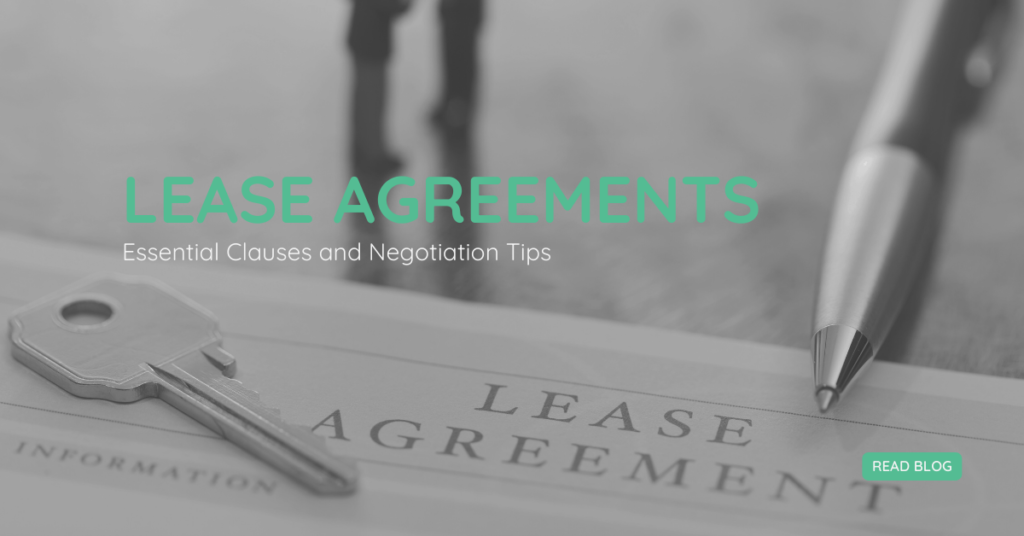Lease Agreements: Essential Clauses and Negotiation Tips
Reading Time: 2 minutesRenting a commercial or residential property involves navigating a complex legal agreement known as a lease. Ensuring your lease includes the right clauses and negotiating favorable terms are crucial to protecting your interests as a tenant. In this article, we’ll explore the essential lease clauses you should consider and provide tips for effective lease…

Renting a commercial or residential property involves navigating a complex legal agreement known as a lease. Ensuring your lease includes the right clauses and negotiating favorable terms are crucial to protecting your interests as a tenant.
In this article, we’ll explore the essential lease clauses you should consider and provide tips for effective lease negotiations.
Table of Contents
Essential Lease Clauses

1. Severability Clause
This clause ensures that if any part of the lease is deemed invalid, the rest of the agreement remains enforceable. It’s a critical safeguard against the entire lease being invalidated by the courts.
2. Joint and Several Liability
This clause holds all tenants equally responsible for the full rent payment, even if one or more roommates fail to pay their share. It helps ensure the landlord receives the complete rent amount each month.
3. Occupancy Limits
Clearly defining the maximum number of occupants allowed in the property helps prevent overcrowding, damage, and disturbances. This clause should align with any applicable state or local laws.
4. Noise and Disturbance Restrictions
Outlining rules around excessive noise, parties, and other potential disturbances can help maintain a peaceful living environment for all tenants.
5. Surrender of Premises
This clause specifies the move-out procedures, fees, and conditions the tenant must follow when vacating the property at the end of the lease term.
Effective Lease Negotiation Tips

1. Understand the Details
Commercial leases can be complex, with fine print that can significantly impact your tenancy. Carefully review all clauses and seek clarification on any ambiguous terms.
2. Leverage Competition
If you’re negotiating for a desirable property, use the competition to your advantage. Demonstrate that you have other options and are willing to walk away if your terms are not met.
3. Verify the Landlord’s Math
Don’t take the landlord’s calculations at face value. Carefully review the numbers, such as operating expenses and taxes, to ensure you’re not overpaying.
4. Consider Hiring a Tenant Representative
A tenant representative, or “tenant rep,” can be a valuable asset in commercial lease negotiations. They have extensive market knowledge and can help you secure the best deal.
5. Understand the Power of Lease Term Length
Landlords often prefer longer-term leases, as they provide more stability. If you can commit to a longer lease, you may be able to negotiate more favorable terms, such as lower costs.
Conclusion
Remember, a well-crafted lease agreement and effective negotiation strategies can make a significant difference in your overall tenancy experience. By understanding the essential clauses and employing these negotiation tips, you can secure a lease that protects your interests and sets you up for success.
Looking for a trusted property management partner to handle your commercial or residential lease agreements? Contact Green Ocean Property Management today and let us guide you through the process with our expertise and personalized service.
How to Find a Budget-Friendly Property Management Company in Boston
Reading Time: 3 minutesFinding the perfect budget-friendly property management company in Boston might seem challenging, but with the right approach, you can ensure your properties are well-managed without breaking the bank. In this article, we’ll share valuable tips to help you find the ideal property management company that aligns with your budget and needs. Seek Out Referrals…
Avoiding Tenant Complaints: Your Guide to Happy Renters
Reading Time: 5 minutesRunning a rental property shouldn’t give you headaches. Yet many landlords find themselves dealing with endless tenant complaints and midnight emergency calls. Fortunately, most common problems can be prevented with the right approach. Why Tenants Complain (And Why You Should Care) Tenants complain for various reasons, and as a property owner, it’s…
Should we allow tenants to leave personal belongings in the basement
Reading Time: 2 minutes We manage hundreds of multifamily properties across greater Boston and what that means is lots of basements that must be cleaned, organized, and secured. In relation to that, we often get this question: “Should we allow our tenants to leave personal belongings in the basements of the houses that we manage?” The answer is NO….








